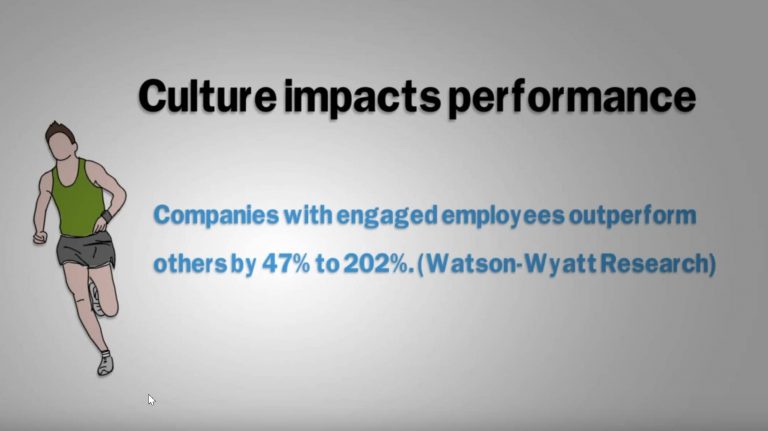Is your workplace culture a competitive advantage? If not, why not?
Workplace Culture Affects Company Performance
We typically hear about organizational culture in Human Resources circles or in the news when big headlines hit. But without an understanding of exactly how culture affects people and ultimately performance it’s easy to lose track of why a leader or a company might want to invest time and energy in developing it.
If working on a company culture didn’t actually do anything but make employees a bit happier at work, then one might think of it as a low business priority. After all, it takes time to build the necessary communication, hiring, rewards, and recognition infrastructure needed to make a culture successful.
We have seen some companies’ business cultures become so effective that they have even differentiated their company brand because of it.
A positive and deliberate culture impacts performance.

• Companies with engaged employees outperform others by 47% to 202% (Watson-Wyatt Research).
• Organizations with employee engagement scores in the top quartile had 18% higher productivity and 16% higher profits (Gallup).
• Highly engaged employees are 87% less likely to leave their organizations than highly disengaged employees. (Corporate Executive Board)
“Culture change led from the top and encompassing every part of the organization can deliver huge cost savings, improve performance, and boost profitability.” ~ Senn Delany
- The 2006 Maritz® Customer Experience Study found 43% of all customers who defect do so because of customer service issues.
- The study also found 77% of the time those customers blamed employee attitude as the primary reason leading to their defection.
- “A good culture is a competitive asset associated with economic performance” Almost 25% of the returns in sample companies were accounted for by the relative strength of their corporate culture. ~ Ronald Burt, University of Chicago Booth School of Business.
- Other research snippets you’ll see around the web on culture and happiness at work.
Happy employees:
- are 300% more innovative (HBR)
- have 50% less safety incidents (BMC)
- have 66% lower sick leave (Forbes)
- have 125% less burnout (HBR)
Next week we’ll be talking about the importance of trust when building customer relationships and how culture directly impacts trust.



